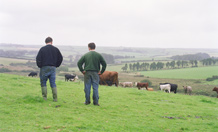
Cornish landscape
Past environments and the sustainable future in Cornwall
Recent concerns about floods, drought, energy efficiency and sustainable land use have brought communities together to devise strategies to cope with environmental change.
On Saturday 2 July a public workshop is being held at the Cornwall Centre in Redruth, to investigate the historical context of these issues.
Historians from the University of Exeter’s Cornwall Campus, will join experts to provide a greater understanding of the human response to changes in the environment and landscape over recent decades. The Arts and Humanities Research Council (AHRC) funded workshop will use literature, maps, oral history, practical knowledge and the evidence of historical landscapes to analyse the past and how such changes have shaped local attachments to a place, knowledge and memory over time.
Dr Garry Tregidga is a historian and assistant director of the Institute of Cornish Studies, at the University of Exeter’s Cornwall Campus and is one of the speakers at the workshop. His talk is entitled ‘Locating the Clay Country: Narratives of Landscape and Identity in Mid-Cornwall’. Dr Garry Tregidga said: “It is important to locate current debates on environment and sustainability in a broader historical context. In that way we can learn from past experiences and apply those vital lessons to the needs of the present and future.”
He added: “Moreover, the public workshop at Redruth is a useful reminder of the need to ‘Think Globally, Act Locally’. By investigating a specific case study like Cornwall we can show how environmental change has been experienced in our own communities.”
Speakers include members of the Institute of Cornish Studies (University of Exeter), CAVA, the Tamar Valley AONB, the National Trust, English Heritage, University College Falmouth, VCH Cornwall, and Saveock Water Archaeology.
The all day workshop is open to members of the public at a cost of £6.00 which includes lunch and tea. The event runs from 9.30 until 4.30pm. For further information contact Nicola Whyte from the History department at the University of Exeter’s Cornwall Campus.
Date: 30 June 2011
